|
|
|
Sort Order |
|
|
|
Items / Page
|
|
|
|
|
|
|
| Srl | Item |
| 1 |
ID:
067217
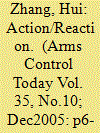

|
|
|
| 2 |
ID:
076798
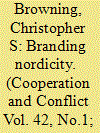

|
|
|
|
|
| Publication |
2007.
|
| Summary/Abstract |
This article introduces the idea of brands to debates about Nordic models and identity. Understanding brands to be more strategic and stable than identities, the article shows how a Nordic brand was marketed during the Cold War, but has since been challenged and undermined by a number of pressures. Central to the Nordic brand have been ideas of Nordic 'exceptionalism'-of the Nordics as being different from or better than the norm-and of the Nordic experience, norms and values as a model to be copied by others. In the post-Cold War period, key aspects of the Nordic brand have been challenged. On the one hand, elements of the Nordic elite appear to have forsaken the brand. On the other, broader recognition of a distinct Nordic brand is being undermined with the melding of Nordic with European practices and processes. The article concludes by asking whether the decline of the Nordic brand matters and further explores the link between Nordicity as a brand and as an identity
|
|
|
|
|
|
|
|
|
|
|
|
|
|
|
|
| 3 |
ID:
076800
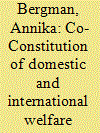

|
|
|
|
|
| Publication |
2007.
|
| Summary/Abstract |
Sweden's self-narrative is that of an outward-looking internationalist state whose commitments to justice and equality are not confined to co-nationals. What distinguishes Swedish internationalism, apart from being social democratically inspired, is that it rests on a thin conception of cosmopolitan duty that does not exclusively privilege the rights of Swedish nationals alone, but recognizes the need to extend social and political rights to non-nationals as well. Key here is the universality principle of the Nordic welfare model, which inspires policies that do not tend to discriminate on the basis of class or ethnic background. What is more, this way of thinking has not generally been confined to the domestic level, but can be traced through to Sweden's (and the other Nordic states') distinctive foreign policy traditions. This article examines the inter-connection between domestic and international welfare commitments in the Swedish context. The key thesis developed here is that states that promote the values of solidarity, inclusiveness and universal welfare at the national level are also more likely to do so beyond borders. The article deconstructs the endogenously framed ideational factors that underpin Swedish internationalism, with particular focus on social democracy in the process. It also investigates the co-constitutive relationship between Sweden's domestic and international welfare commitments by exploring contemporary discourses and practices that make up a significant part of Sweden's self-identity. Finally, it analyses the normative relevance of a social democratically inspired Swedish internationalism for the future of Nordic internationalism more generally.
|
|
|
|
|
|
|
|
|
|
|
|
|
|
|
|
| 4 |
ID:
076801


|
|
|
|
|
| Publication |
2007.
|
| Summary/Abstract |
With domestic political cultures in which the values of solidarity, equity and social justice figure large and a long history of internationalism in foreign policy, the Nordic states offer themselves as prototypical 'good international citizens'. Danish foreign policy long had a passive quality to it, nonetheless it has been broadly consistent with the Nordic internationalist tradition, especially with the adoption of 'active internationalism' after 1989. Since the 2001 Election of the first Fogh Rasmussen government, however, the ethico-political rationales underpinning Danish internationalism appear to be changing at the same time as Denmark has enacted a controversially much more restrictive and, critics argue, strongly culturally framed immigration and refugee policy. Although the Fogh Rasmussen governments have not abandoned internationalism, and key aspects of current Danish foreign policy resonate fully with the Nordic internationalist tradition, Denmark is now much more closely aligned with the US and the muscular internationalism that it promotes. It may now be the case that a normatively re-jigged internationalism helps to legitimate an overtly exclusionary Danish national narrative. Since the 'cartoon crisis', however, there are signs of a greater sensitivity to cultural politics in Danish foreign policy, but it remains moot whether this will flow through into the government's handling of the relationship between the peoples that comprise contemporary Denmark.
|
|
|
|
|
|
|
|
|
|
|
|
|
|
|
|
| 5 |
ID:
076797
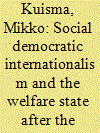

|
|
|
|
|
| Publication |
2007.
|
| Summary/Abstract |
The 'Nordic model' is often seen to exist in political economy, where, according to many commentators, the main components of the model have been the universal welfare state, centralized wage-bargaining structures and high level of taxation. However, the argument in this article is that the 'Nordic model' should be seen as a broader concept, ranging from social and economic policy to foreign and security policy. In addition, the central claim here is that the socio-political history of that model is crucially important in providing understanding of the linkages in ideational inspiration across these different policy sectors. The 'Nordic normative legacy' and the experience of nation- and state-building and construction of national identity were important in the construction of the welfare state. However, the 'Nordic model' was traditionally based on a form of 'welfare state nationalism' that is becoming increasingly difficult to sustain in the 'global age'. The main problem comes from confronting the challenges of multiculturalism. It is one of the central arguments here that the decline of Nordic internationalism and the 'crisis' of the welfare state are inherently linked. The 'Nordic model' is not well equipped to deal with the blurring of the boundaries between internal and external-domestic and foreign. However, as Nordicity and its social foundations are still largely intact, the task now is to rejuvenate the 'Nordic model' and move away from welfare state nationalism towards a more inclusive concept of welfare state internationalism.
|
|
|
|
|
|
|
|
|
|
|
|
|
|
|
|
| 6 |
ID:
076802


|
|
|
|
|
| Publication |
2007.
|
| Summary/Abstract |
Several new ways of security-speak are about to enter the European scene. The article seeks to identity these by investigating the use and unfolding of the security argument in the context of the European Union's (EU) new security doctrine and the devising of an explicit neighbourhood policy. In addition to tracing the way the plot structure underpinning the EU is changing, alternative options are sought by tapping into the potential offered by the way security works in the case of the Nordic constellation. Juxtaposing of the EU and the Nordic entity is also there in order to challenge the increasingly closed and non-negotiable European configuration and to open it up for critical scrutiny.
|
|
|
|
|
|
|
|
|
|
|
|
|
|
|
|
| 7 |
ID:
076799
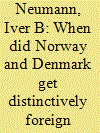

|
|
|
|
|
| Publication |
2007.
|
| Summary/Abstract |
The emergence of the modern state and the European states system limned the inside of a state different from its outside. Inside the state, peace and progress could be furthered by means of disciplinary power, while outside the state, anarchy reigned. Academic disciplines such as political theory, International Relations and International History treat this divide as foundational, and so the knowledge they produce contributes to its reproduction. The article traces the emergence of the divide where Norway and Denmark are concerned through a reading of the concept of 'realm' (rike), and asks when Norway evolved a foreign policy (as distinct from a non-discriminating foreign/domestic one). There are two extant views. A legal view starts from sovereignty and fixes the date at 1905, whereas a nationalistic view popular with historians treats it as originary to the political entity of Norway, which means that it may be dated back some thousand years or so. Treating discriminating institutions such as foreign ministries as preconditions for the existence of a permanent divide between inside and outside, the article suggests the end of the eighteenth century. One may speculate that the firming of the divide is related to the rise of nationalism, in which case it is not surprising that the two phenomena fade concurrently. Since Nordic cooperation stood out as a special phenomenon in international relations because of the particular way in which it handled the domestic/foreign divide, Nordic cooperation will lose its role as special in the degree to which the domestic/foreign divide becomes less foundational
|
|
|
|
|
|
|
|
|
|
|
|
|
|
|
|
|
|
|
|
|